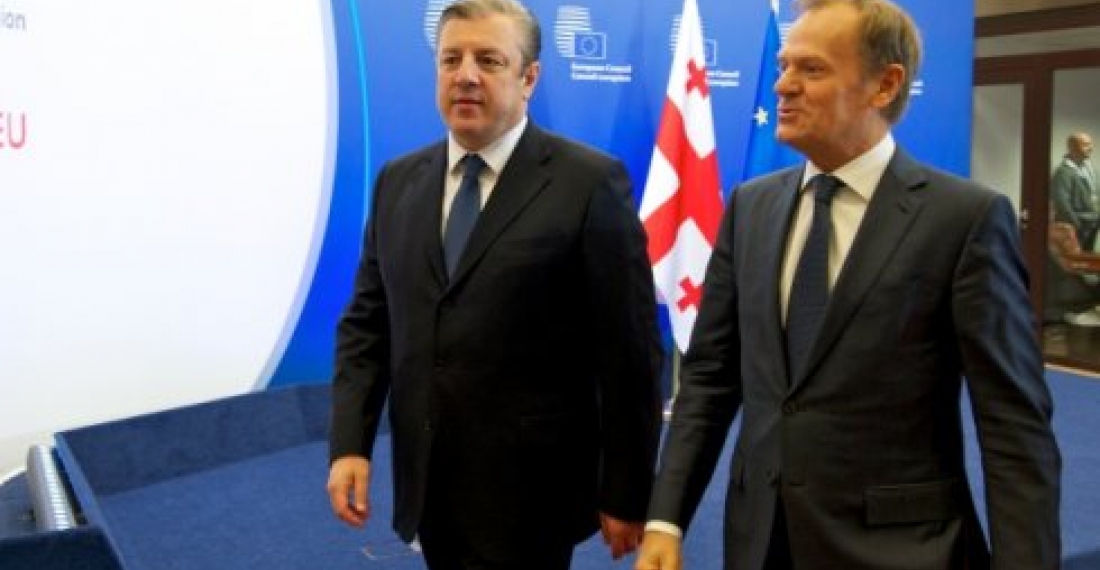Премьер-министр Грузии Георгий Квирикашили в настоящее время находится в Брюсселе, где ему был оказан очень теплый прием лидерами Европейского Союза. Квирикашили, в сопровождении ряда высокопоставленных министров, сегодня (пятница, 2 декабря), примет участие в заседании Совета ЕС-Грузия. В то же время он провел встречи с лидерами Европейского Союза, в том числе президентом Совета Европы, Дональдом Туском, президентом Европарламента Мартином Шульцем и рядом европейских комиссаров.
Визит был частично омрачнен новостью о том, что принятие решения о предоставлении безвизового режима для граждан Грузии, желающих посетить страны Шенгена, в очередной раз было отложено. Причиной отсрочки является сложные процессы принятия решений в ЕС, и не имеет ничего общего с выполнением необходимых критериев со стороны Грузии. Все лидеры ЕС и должностные лица, которые говорили по этому вопросу подтвердили, что Грузия сделала все то, что ожидалось от нее по этому вопросу.
Ситуация вызвала некоторый конфуз среди официальных лиц ЕС, которые должны были объяснить её своим грузинским коллегам. Президент Совета Европы Дональд Туск после встречи с Георгием Квирикашвили сообщил журналистам, что "Грузия заслуживает своевременного и позитивного завершения процесса либерализации визового режима", поскольку страна выполнила все свои обязательства по этому вопросу.
"Сейчас мы работаем над ответным действием ЕС. И я хочу подчеркнуть, что [работаем] только со стороны ЕС, потому что теперь это исключительно наша внутренняя проблема; надо убедиться, что необходимый механизм приостановки безвизового режима /.../ будет согласован как можно скорее", - сказал Туск.
Однако, и ЕС, и грузинские официальные лица, весьма оптимистичны касательно нынешнего состояния отношений между Грузией и ЕС. Официальные лица ЕС приложили все усилия, чтобы оказать Квирикашвили теплый прием во время его пребывания в Брюсселе и дали высокую оценку его руководству, а также реализации Грузией амбициозной программы реформ. В ходе каждой встречи чиновники ЕС поздравляли Квирикашили в связи с его недавней победой на выборах и высоко оценили проведение выборов.
Высокопоставленный источник в Брюсселе сообщил commonspace.eu, что отношения ЕС-Грузия являются образцовыми, и ЕС полон решимости не допустить того, чтобы вопрос о либерализации визового режима подпортил их. Кажется, у грузинской стороны такой же подход. Выступая на ужине в посольстве Грузии в Брюсселе, на котором присутствовали высокопоставленные должностные лица ЕС, депутаты Европарламента и представители аналитических центров, Георгий Квирикашили сказал, что грузинское правительство верит тому, что ЕС выполнит свои обещания. В своем выступлении Квирикашили отметил те перемены, которые правительство осуществляет в области образования в рамках своей стратегии построения сильного государтсва.
источник: commonspace.eu
фото: президент Европейского Совета, Дональд Туск, с премьер-министром Грузии Георгием Квирикашвили в Брюсселе, 1 декабря 2016 года (фото предоставлено пресс-службой Европейского Совета)







